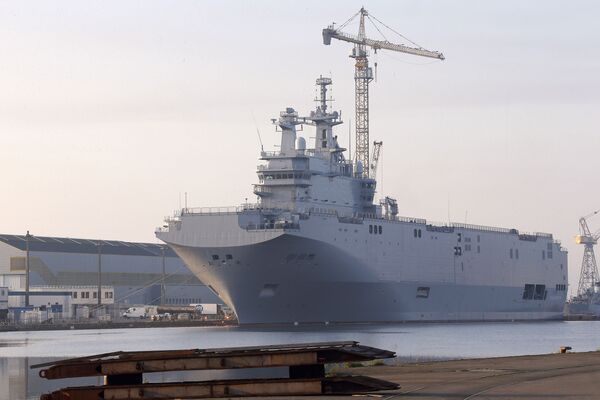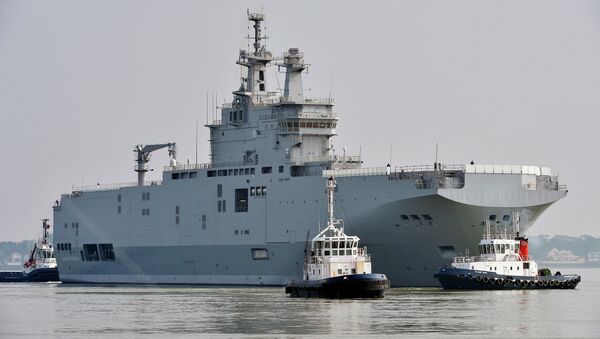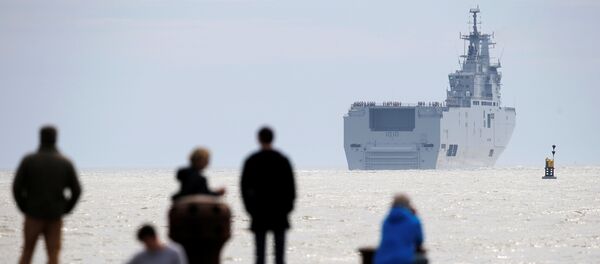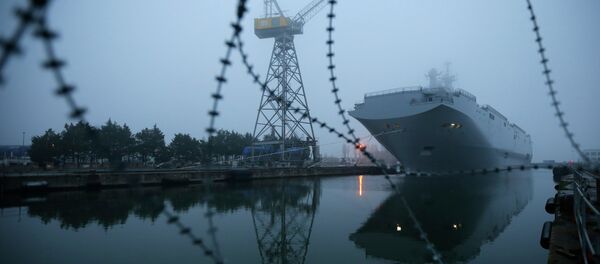Analysts consider the Ka-52K Katran naval attack helicopters to be the optimal choice for Egypt's Mistrals because they were specifically designed to be carried aboard the French-made amphibious assault ships. French shipbuilders had built the two Mistral ships for Russia, but the deal fell through in 2015 amid deteriorating relations and pressure on Paris from Washington.
The Russian Navy has since adapted the Ka-52Ks for operations aboard the Admiral Kuznetsov aircraft carrier.
Each Mistral is capable of carrying up to 16 Ka-52Ks. However, military observers believe that Cairo is likely to purchase eight helicopters per carrier.
It is rumored that Russian engineers are already at work adapting the attack helicopters according to Egyptian military requirements. Furthermore, as independent Russian military analyst Alexander Sitnikov pointed out, apart from the choppers, Russia may also reinstall the equipment it had removed from the Mistrals following the breakdown in the deal with Paris.
"In this way," Sitnikov wrote, "we can speak about the beginnings of a new strategic alliance in the Middle East."
"It's worth recalling that in January, Egypt announced the creation of its Southern Fleet [based in the Red Sea]. In addition to the Mistrals, built by STX France at St Nazaire, it will include a Franco-Italian built FREMM multipurpose frigate, four Gowind 2500 corvettes, and four German-built Type 209 diesel-electric attack submarines."
"It's obvious," Sitnikov wrote, "that the capabilities of this group of warships will not correspond to Cairo's declared geopolitical ambitions without air support."
And that's where Russia comes in, according to the analyst. Moscow, after all, had worked with the French to sell the formerly Russian-bound Mistrals specifically to Egypt. The latter's relations with Washington had sharply soured in 2013, when the US-supported Islamist president Mohammed Morsi was overthrown by the military.
"The US's shameless interference in Egypt's internal affairs through its support for the so-called Arab Spring became a sobering moment for most Egyptians, who realized that the US was pushing them into an abyss." In this situation, Sitnikov noted that it was only logical that Cairo turned to Paris and Moscow "who, in spite of the pressure from Washington, were able to maintain contacts between one another."

"Egyptian journalist Ahmed Sayed, who has been covering the story surrounding the Mistrals, took note of special warm relations between the Egyptian, French and Russian specialists working aboard the ships," the analyst recalled.
As for the cancellation of the French-Russian Mistral deal, this had a negative impact on STX France's reputation in particular, "and on the image of the French defense industry as a whole," Sitnikov stressed. This was confirmed in a survey of French attitudes in 2015, when 72% of respondents confirmed that following through with military contracts was in France's national interest, while their cancellation carried with it considerable economic risks.
"It was for this reason that Paris did everything possible to ensure that everyone remained happy, returning Russia's €949.7 million deposit, and factually transferring key technologies, including the large-block construction of helicopter carriers, and waterproof protection [technology]. France's Le Monde estimated that value of the design documentation handed over to Moscow in the Mistral deal amounted to €220 million. The issue of technology transfer was considered an integral part of the Mistral deal for Russia from the beginning.
Ultimately, the military observer noted that "if Russia wins the tender for the helicopters for the Mistrals (and the probability is very high), Egyptian experts will allow Russian naval engineers access to all the ships' systems. This will allow our specialists to understand in practice how NATO helicopter carriers operate. Factually, the Russian Defense Ministry does not hide the fact that the experience of such cooperation will be taken into account when developing [home-grown] analogues of such vessels."
"By and large," Sitnikov wrote, "Russia had planned to build helicopter carriers based on the Mistral at its own shipyards from the beginning. The order of one, and then two of the amphibious assault ships from France could be seen as a kind of commercial concession. To be frank, Moscow has received the documentation for the Mistral for free. More precisely, it received it for Cairo's money."
And Egypt itself is the biggest winner in all this, according to the analyst. "After deploying their Southern Fleet, Cairo will become a regional maritime power, and will be able to protect the giant gas field recently discovered near its exclusive economic zone. At the moment, Turkey, Israel, Cyprus and Greece have claims to this asset. But as experience in dispute resolution has shown, warships are the best argument."
BP discovers 3rd gas field 'Qattameya' in Egypt. Region estimated by USGS to equal 5% of current global gas reserveshttps://t.co/GAGQfUzzh2 pic.twitter.com/aIR2C9eAn7
— TeslaRevolution (@R_Koppelaar) 28 марта 2017 г.
In addition, the Southern Fleet will also allow Cairo to protect the merchant sea routes in the Gulf of Aden, and even wield influence over Iran and Saudi Arabia in the ongoing conflict in Yemen.
Ultimately, "none of the participants in this transaction lost out. Paris, disobeying Washington, got additional military contracts; Russia got the documentation for the Mistral, along with a new strategic ally; Egypt acquired the status of a naval power," Sitnikov concluded.






